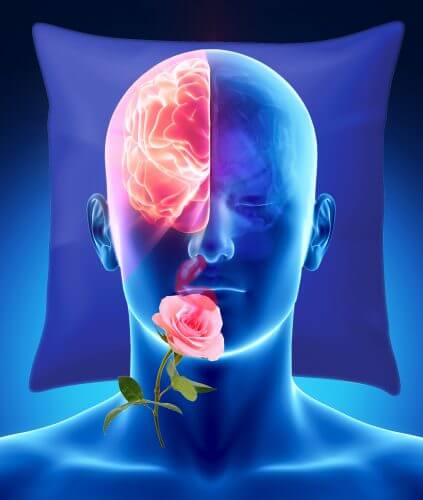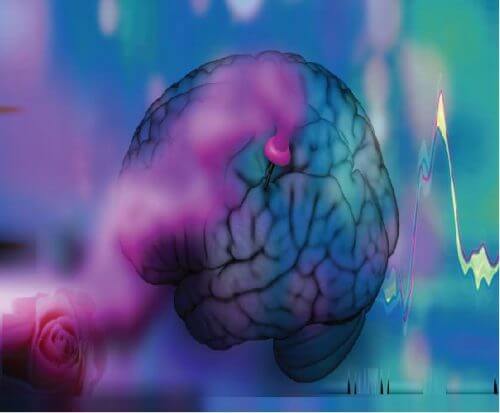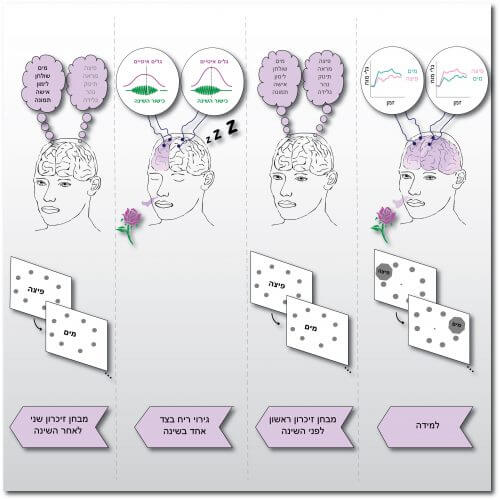The groundbreaking method may help in the future in the rehabilitation of post-trauma victims and people with brain damage * The research will be published on Thursday 5.3.20/XNUMX/XNUMX in the journal Current Biology

A joint study by Tel Aviv University and the Weizmann Institute of Science yielded an innovative method to test and have a separate effect on the process of memory formation on one side of the brain during sleep. The method, which is based on the flow of a memory-evoking fragrance into one nostril only, may in the future help strengthen the memory on the affected side in brain victims. In addition, it may help restore balance to the brains of post-trauma victims.
The leaders of the research are: Ella Bar, a joint doctoral student of Tel Aviv University and the Weizmann Institute of Science, Prof. Yuval Nir from the Segol School of Neuroscience and the Department of Physiology and Pharmacology at the Tel Aviv University School of Medicine, Prof. Yadin Dodai, Prof. Noam Sovel and Prof. Roni Paz from the Department of Neurobiology at the Weizmann Institute of Science.
The study was published in the journal Current Biology.
"We know that during sleep a process of memory consolidation (consolidation) takes place in the brain," explains Prof. Nir. "Recently accumulated memories in the short-term memory store located in the hippocampus are gradually transferred to the long-term memory store in the cerebral cortex. In this study, we sought to examine in depth the process of memory formation in the brain during sleep - by comparing the brain activity in the areas where it occurs to the activity in the areas where it does not occur."
The research participants were asked to learn the location of words that appeared in front of them on a screen one after the other - some on the right and some on the left. "We know from other studies that things that appear in the left visual field are stored in the right side of the brain, and vice versa," says Ella Bar. "Without the subjects knowing about it, we divided the words equally - the middle appeared on the right and the middle appeared on the left." In addition, during the learning, a pleasant smell of roses was infused through a mask that covered the subjects' noses. Immediately after learning, the subjects performed a memory test on the words they had learned.
After the memory test, the subjects were asked to sleep in a room designated for this purpose. Using a specially designed device that separates the respiratory environment of the two nostrils, the researchers injected pulses of rose fragrance into only one nostril of the sleeping subject. "The smell, which is associated in the participants' minds with the learning task that was performed earlier, came from the nostril where it was injected into the part of the brain on the same side," Ella says. "We tested its effect on the process of memory formation on the side affected by the smell compared to the side that did not receive pulses of the smell of roses."

The researchers used an EEG device to compare the brain waves on both sides of the brain. They found that during the administration of the scent pulses there is an increase in the intensity of the brain waves associated with memory formation, and on the receiving side an increased synchronization between the brain waves is observed - a phenomenon that apparently encourages the process of memory formation. Another finding was that the sleep on the side of the brain that perceived the smell was lighter at the time, and the lighter the sleep, the better the subject's memory (according to the final test). And the most crucial test of all: after waking up, the subjects were asked to take another memory test for the words they were exposed to before falling asleep. "We found that word locations stored on the side of the brain that was affected by the smell were remembered significantly better than word locations stored on the other side." Ella Bar says.
"The method we developed makes it possible for the first time to compare the memory formation processes on both sides of the brain - in the same person and at the same stage of sleep, and it will help us and other researchers in follow-up studies to understand the contribution of sleep to memory," Prof. Nir concludes. Ella adds: "In addition, we found that the method intensifies the formation of memory on one side of the brain, so it may serve as a basis for developing treatments in the clinic. Such treatment may help patients with brain damage following an accident or stroke, as well as post-trauma victims - they have overactivity of the right, emotional side of the brain when recalling the traumatic experience; Strengthening the left side, which is responsible for the verbal expression of the trauma, may create balance and help them cope."

for the scientific article
More of the topic in Hayadan:
How many cells does it take to produce memory?
How we link memories to each other and make associations
How does the brain set limits to memory search?

3 תגובות
Interesting to hear about other applications
The method of carrying out the research using a specific smell during learning and during sleep and memory consolidation is original and very impressive. Good luck in developing treatments based on the findings.
Remind me what this is about?